Starting a truck company can be a lucrative venture in the transportation industry, offering opportunities for entrepreneurship and economic growth.
However, the initial costs involved in launching a trucking business can be substantial, making it challenging for aspiring entrepreneurs to turn their dreams into reality.
Fortunately, there are federal grants for trucking companies available to provide financial assistance and support to individuals looking to establish their own trucking enterprises.
These grants serve as invaluable resources, offering funding for various aspects of the business, including vehicle acquisition, infrastructure development, and operational expenses.
In this article, we will explore the process of applying for federal grants to start a truck company, outlining the eligibility criteria, required documents, and steps involved in the application process.
By understanding how to navigate the world of grant funding, aspiring trucking entrepreneurs can access the support they need to embark on their entrepreneurial journey successfully.
What Are Trucking Grants?
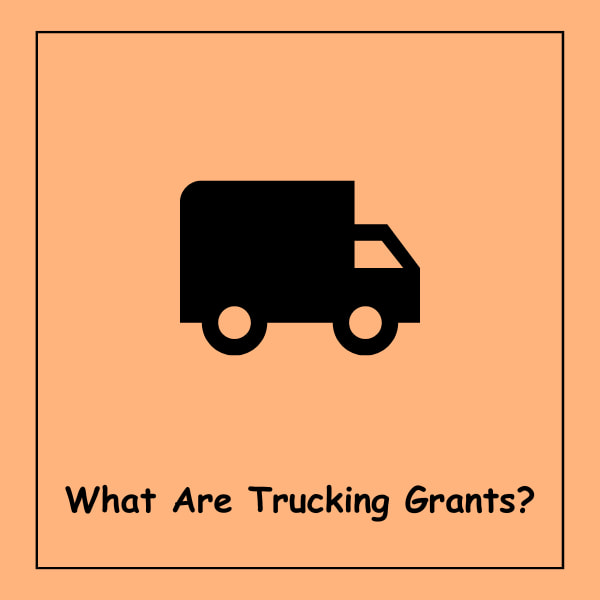
Trucking grants represent essential financial resources tailored to support individuals and entities operating within the transportation sector, primarily focusing on trucking activities.
These grants serve as pivotal tools in facilitating the growth and development of trucking businesses by offering financial assistance across various operational aspects.
At their core, trucking grants aim to alleviate the financial burdens associated with starting, expanding, or improving trucking operations.
They often cover a diverse range of expenses, including but not limited to vehicle acquisition, maintenance and repairs, fuel costs, technology upgrades, training programs, and infrastructure enhancements.
Such comprehensive coverage enables recipients to address critical needs within their trucking businesses, ultimately fostering sustainability and competitiveness within the industry.
These grants are typically made available through a variety of sources, including government entities at the federal, state, and local levels, as well as private foundations, non-profit organizations, and industry associations.
Each funding source may have its unique set of eligibility criteria, application processes, and funding priorities, reflecting diverse objectives and target populations.
Federal trucking grants, for instance, may be part of broader transportation funding initiatives aimed at enhancing safety, efficiency, and environmental sustainability within the trucking industry.
State-level grants might prioritize local economic development, infrastructure improvements, or workforce training programs to bolster the trucking sector’s capacity and resilience.
Eligibility for trucking grants can vary widely depending on factors such as the applicant’s business structure, size, geographic location, industry focus, and specific project goals.
While some grants may target small, minority-owned trucking businesses, others may be open to larger fleets or industry consortia collaborating on innovative initiatives.
Successful grant applicants typically demonstrate a clear understanding of their business needs, articulate how grant funds will be utilized to achieve specific objectives, and provide compelling evidence of their capacity to effectively manage grant-funded projects.
Additionally, adherence to grant application guidelines, timely submission, and thorough documentation are crucial to maximizing chances of securing funding.
Trucking grants play a vital role in bolstering the trucking industry’s vitality and resilience by offering essential financial support to businesses and individuals engaged in various aspects of trucking operations.
By leveraging these grants, recipients can overcome financial barriers, invest in critical resources, and pursue growth opportunities, ultimately contributing to the overall advancement and sustainability of the transportation sector.
Eligibility Criteria And Documents Required For Tracking Grants
- Business Structure and Registration: Before applying for trucking grants, applicants must ensure that their business is legally registered and compliant with all relevant regulations. This typically involves registering as a sole proprietorship, partnership, limited liability company (LLC), or corporation, depending on the chosen business structure. Proof of business registration, such as a business license or articles of incorporation, may be required during the application process.
- Operational Experience: Many trucking grants prioritize applicants with demonstrated experience in the transportation industry. This may include previous employment in trucking or related fields, such as logistics or freight forwarding. Applicants may be required to provide resumes or work histories detailing their relevant experience in the industry.
- Financial Stability: Granting agencies often assess the financial stability of applicants to ensure that grant funds are used effectively and responsibly. Applicants may be required to submit financial statements, such as profit and loss statements, balance sheets, and cash flow projections, to demonstrate their ability to manage grant funds and sustain their operations.
- Business Plan: A comprehensive business plan is essential for demonstrating the viability and potential impact of the proposed trucking project. The business plan should outline the applicant’s business goals, target market, competitive analysis, marketing strategies, and financial projections. It should also articulate how grant funds will be utilized to achieve specific objectives outlined in the business plan.
- Compliance with Regulatory Requirements: Trucking operations are subject to various regulatory requirements at the federal, state, and local levels. Applicants must ensure compliance with applicable regulations, such as commercial driver’s license (CDL) requirements, vehicle registration, insurance coverage, and safety regulations. Proof of compliance with regulatory requirements may be requested as part of the application process.
- Environmental Impact: Some trucking grants prioritize projects that demonstrate a commitment to environmental sustainability and reducing carbon emissions. Applicants may be required to provide information on the environmental impact of their proposed trucking operations and outline strategies for minimizing emissions, such as investing in fuel-efficient vehicles or alternative fuel technologies.
- Target Population or Geographic Area: Certain trucking grants may target specific populations or geographic areas, such as minority-owned businesses, rural communities, or regions with limited access to transportation services. Applicants must carefully review grant eligibility criteria to determine whether their business meets any specific demographic or geographic requirements.
- Collaborative Partnerships: In some cases, trucking grants may encourage or require collaborative partnerships between multiple organizations or stakeholders. Applicants may need to demonstrate partnerships with other businesses, government agencies, non-profit organizations, or educational institutions to strengthen their grant applications and leverage additional resources.
- Documentation Requirements: Along with meeting eligibility criteria, applicants must prepare and submit various documents as part of their grant applications. Commonly required documents may include business registration certificates, resumes or bios of key personnel, financial statements, business plans, environmental impact assessments, regulatory compliance certificates, and letters of support or partnership agreements.
How Do You Apply for Federal Truck Company Grants?
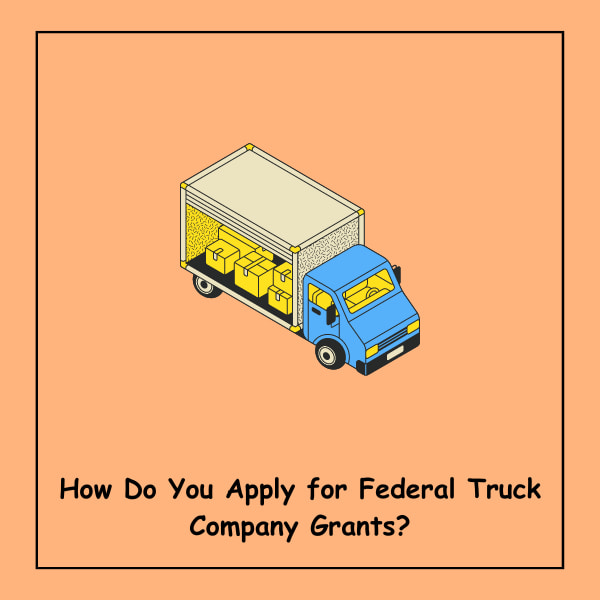
- Research Grant Opportunities: The first step in applying for federal truck company grants is to research available grant opportunities from government agencies, such as the U.S. Department of Transportation (DOT) or the Small Business Administration (SBA). These agencies often publish grant announcements and guidelines on their websites, outlining eligibility criteria, application procedures, and deadlines.
- Review Eligibility Criteria: Carefully review the eligibility criteria for each grant opportunity to determine whether your trucking business meets the requirements. Pay attention to factors such as business size, industry focus, geographic location, and project objectives.
- Prepare Required Documents: Gather all required documents, including business registration certificates, financial statements, business plans, resumes of key personnel, and any other supporting documentation specified in the grant guidelines. Ensure that your documents are accurate, up-to-date, and well-organized.
- Complete the Application Form: Most federal grant programs require applicants to complete an online application form through the agency’s grant management system. Follow the instructions provided in the application form, and carefully enter all required information.
- Submit the Application: Once you have completed the application form and attached all required documents, submit your grant application before the specified deadline. Late or incomplete applications are typically not considered for funding, so be sure to submit your application on time and in full compliance with the grant guidelines.
- Monitor Application Status: After submitting your grant application, monitor the status of your application through the grant management system or contact the granting agency for updates. Be prepared to respond to any requests for additional information or clarification from the agency.
- Grant Award Notification: If your grant application is successful, you will receive a grant award notification from the granting agency. Review the terms and conditions of the grant award carefully, and follow any instructions provided for accepting the grant funds and fulfilling reporting requirements.
- Implement Grant-Funded Projects: Upon receiving grant funding, begin implementing the proposed trucking projects outlined in your grant application. Keep detailed records of project activities, expenditures, and outcomes to comply with reporting requirements and ensure accountability.
- Comply with Reporting Requirements: Federal grant recipients are typically required to submit periodic progress reports and financial reports to the granting agency throughout the grant period. Ensure timely submission of all required reports to maintain compliance with grant terms and conditions.
By following these steps and adhering to grant guidelines, you can effectively apply for federal truck company grants and access valuable funding opportunities to support your trucking business initiatives.
What Are The Available Federal Grants To Start A Truck Company?
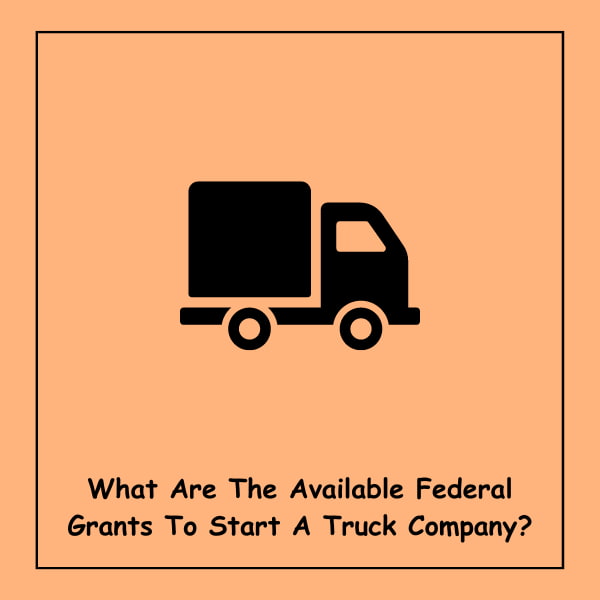
- Small Business Administration (SBA) Grants: The Small Business Administration offers various grant programs designed to support small businesses, including those in the trucking industry. While the SBA primarily provides loans, it occasionally offers grants through specific initiatives targeting entrepreneurship, innovation, and economic development. These grants may cover startup costs, equipment purchases, or training programs for trucking entrepreneurs.
- Department of Transportation (DOT) Grants: The Department of Transportation administers several grant programs aimed at improving transportation infrastructure, enhancing safety, and promoting innovation in the trucking industry. These grants may fund projects such as road construction, bridge repair, truck parking facilities, or technology upgrades to improve fleet efficiency and reduce emissions.
- Environmental Protection Agency (EPA) Grants: The Environmental Protection Agency offers grants to support initiatives aimed at reducing air pollution and promoting environmental sustainability within the transportation sector. These grants may fund projects to retrofit diesel trucks with emission control technologies, transition to alternative fuels, or implement idle reduction strategies to minimize environmental impact.
- Department of Energy (DOE) Grants: The Department of Energy provides grants to support research, development, and deployment of advanced vehicle technologies, including those applicable to the trucking industry. These grants may fund projects focused on improving fuel efficiency, developing alternative fuels, or advancing electric and hydrogen fuel cell technologies for commercial trucks.
- Workforce Development Grants: Federal agencies and state governments offer workforce development grants to support training programs for individuals pursuing careers in the trucking industry. These grants may cover the costs of CDL training, apprenticeship programs, or certification courses, enabling aspiring truck drivers to acquire the skills and credentials necessary to start their own trucking businesses.
- Rural Business Development Grants: The Department of Agriculture provides grants to support economic development initiatives in rural communities, including those related to the trucking industry. These grants may fund projects to establish or expand trucking businesses in underserved rural areas, providing essential transportation services and stimulating local economic growth.
- Veterans Business Outreach Center (VBOC) Grants: The Veterans Business Outreach Center offers grants and resources specifically tailored to support veteran-owned trucking businesses. These grants may provide funding for business development, mentorship programs, or access to specialized training and technical assistance, empowering veterans to succeed in the trucking industry.
- Research and Development Grants: Federal agencies such as the National Institutes of Health (NIH) and the National Science Foundation (NSF) offer research and development grants to support innovative technologies and solutions with potential applications in the trucking industry. These grants may fund research projects focused on improving vehicle safety, efficiency, or sustainability through advanced engineering, materials science, or data analytics.
- Community Development Block Grants (CDBG): The Department of Housing and Urban Development administers Community Development Block Grants to support community development projects, including infrastructure improvements that benefit low- to moderate-income individuals and communities. Trucking companies may access these grants for projects such as road upgrades, truck parking facilities, or transportation services in underserved communities.
By exploring these available federal grants, aspiring trucking entrepreneurs can identify funding opportunities that align with their business goals and objectives.
Each grant program has its unique eligibility criteria, application requirements, and funding priorities, so it’s essential to conduct thorough research and carefully review grant guidelines before applying.
More Grant Opportunities For Trucking Companies
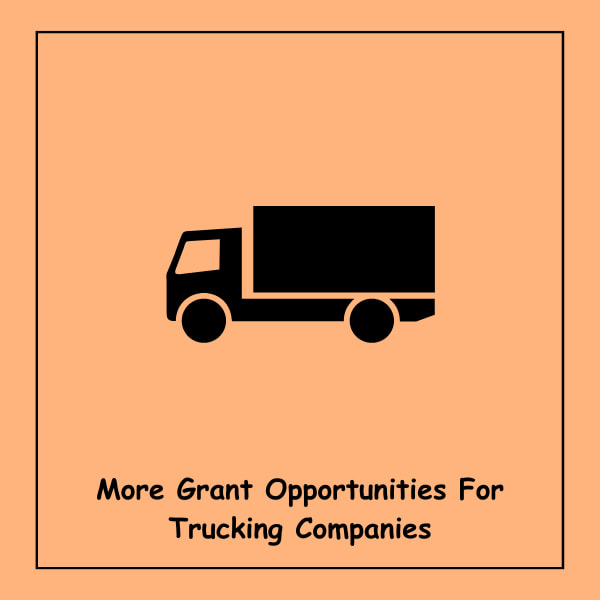
- State-Level Grants: In addition to federal grants, many state governments offer grant programs specifically targeted at supporting trucking companies and transportation-related initiatives. These grants may be administered by state departments of transportation, economic development agencies, or workforce development boards, providing funding for infrastructure projects, business expansion, or workforce training programs.
- Local Economic Development Grants: Local governments and municipalities often provide grant funding to support economic development initiatives that create jobs, stimulate investment, and enhance community infrastructure. Trucking companies may access these grants for projects such as facility upgrades, equipment purchases, or workforce development programs that contribute to local economic growth and prosperity.
- Industry-Specific Grants: Industry associations, trade groups, and non-profit organizations within the trucking industry may offer grant programs to support member companies and promote industry innovation. These grants may fund research and development projects, safety initiatives, or educational programs aimed at advancing best practices and addressing industry challenges.
- Environmental Grants: Environmental organizations and foundations may offer grants to support trucking companies’ efforts to reduce their environmental footprint and adopt sustainable practices. These grants may fund projects such as fleet electrification, renewable energy integration, or carbon offset programs that contribute to environmental conservation and climate change mitigation.
- Technology Grants: Technology companies and research institutions may offer grants to support the development and adoption of innovative technologies within the trucking industry. These grants may fund projects focused on autonomous vehicles, telematics systems, predictive analytics, or digital freight platforms that enhance operational efficiency and competitiveness.
- Safety Grants: Government agencies and non-profit organizations dedicated to transportation safety may offer grants to support initiatives aimed at improving trucking safety and reducing accidents on the road. These grants may fund training programs, safety equipment purchases, or public awareness campaigns that promote safe driving practices and compliance with regulatory requirements.
- Export Assistance Grants: For trucking companies involved in international trade and logistics, export assistance grants may provide funding to support export market development, trade missions, or compliance with export regulations. These grants may be offered by government agencies such as the U.S. Commercial Service or non-profit organizations focused on promoting global trade and exports.
- Disaster Recovery Grants: In the event of natural disasters or emergencies, federal, state, and local governments may offer disaster recovery grants to support businesses affected by the disaster, including trucking companies. These grants may provide funding for infrastructure repairs, equipment replacement, or business continuity planning to help companies recover and rebuild after a disaster.
Other Sources To Start A Trucking Business
- Bank Loans: Traditional bank loans are a common source of financing for entrepreneurs starting a trucking business. Banks offer various loan products tailored to small businesses, including term loans, lines of credit, and equipment financing. These loans typically require collateral and a good credit history, but they can provide substantial funding for vehicle purchases, operating expenses, and other business needs.
- Equipment Financing: Many lenders specialize in equipment financing for trucking businesses, offering loans or leases to help entrepreneurs acquire trucks, trailers, and other essential equipment. Equipment financing arrangements allow businesses to spread the cost of equipment purchases over time, making it easier to manage cash flow and preserve capital for other business expenses.
- Invoice Factoring: Invoice factoring companies provide financing to trucking companies by purchasing their accounts receivable at a discount. This allows businesses to access cash quickly by converting outstanding invoices into immediate funds. Invoice factoring can help trucking companies maintain steady cash flow and cover expenses such as fuel, maintenance, and driver salaries while waiting for customer payments.
- Angel Investors and Venture Capital: Angel investors and venture capital firms may be willing to invest in promising trucking startups in exchange for equity ownership. These investors provide capital to fuel business growth and expansion, often bringing valuable expertise and connections to the table. Trucking entrepreneurs seeking venture capital should be prepared to pitch their business ideas and demonstrate the potential for high returns on investment.
- Crowdfunding: Crowdfunding platforms allow entrepreneurs to raise funds from a large number of individuals by soliciting small contributions through online campaigns. Trucking businesses can use crowdfunding to finance specific projects, purchase equipment, or launch new services. Crowdfunding campaigns can also help generate buzz and attract customers while raising capital.
- Government Contracting Opportunities: Government agencies at the federal, state, and local levels often contract with trucking companies to provide transportation services for public projects, such as road construction, infrastructure development, and disaster relief efforts. Trucking businesses can pursue government contracting opportunities by registering as vendors, submitting bids or proposals, and complying with contracting requirements.
- Franchise Opportunities: Franchising allows entrepreneurs to start a trucking business using an established brand, business model, and support system provided by a franchisor. Franchise opportunities in the trucking industry may include package delivery services, freight brokerage firms, or logistics companies. Franchisees benefit from access to training, marketing support, and operational guidance, reducing the risks associated with starting a new business.
- Trade Credit: Suppliers and vendors in the trucking industry may offer trade credit to customers, allowing them to purchase goods and services on credit terms and pay invoices at a later date. Trade credit can help trucking businesses manage cash flow and finance purchases of fuel, equipment parts, maintenance services, and other operational expenses. Building strong relationships with suppliers can lead to favorable credit terms and discounts.
How Getgovtgrants Can Help You Get Started?

Getgovtgrants is dedicated to aiding aspiring entrepreneurs in kickstarting their ventures by providing a comprehensive array of resources and support.
Our platform offers personalized assistance throughout the grant application process, ensuring entrepreneurs have the guidance they need to navigate the complexities of securing federal grants.
We provide access to an extensive database of available grants, along with training programs and educational resources, to enhance applicants’ understanding of the grant application process.
Additionally, Getgovtgrants fosters networking opportunities among entrepreneurs, experts, and funding agencies, creating a supportive community where individuals can share insights and access additional resources to advance their ventures.
With timely updates and alerts on new grant opportunities, Getgovtgrants empowers entrepreneurs to stay informed and proactive in their pursuit of funding, ultimately helping them turn their business ideas into reality.
Business Plan to Start a Truck Company
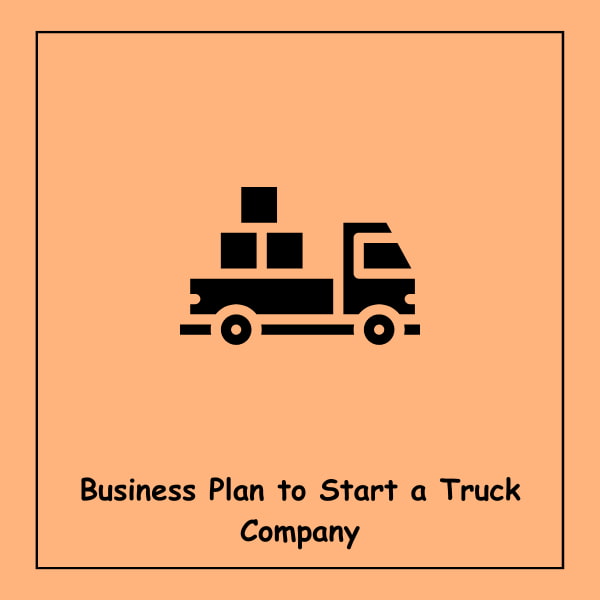
- Executive Summary: The business plan for starting a truck company begins with an executive summary outlining the key components of the business venture. This section provides an overview of the company’s mission, vision, objectives, target market, and competitive advantage. It highlights the unique value proposition of the trucking business and sets the stage for the rest of the plan.
- Company Description: The business plan includes a detailed description of the trucking company, including its legal structure, ownership, and management team. It outlines the company’s history, location, facilities, and operational capabilities. This section also highlights the company’s core values, strategic goals, and long-term vision for growth and expansion in the trucking industry.
- Market Analysis: A thorough market analysis is essential for understanding the competitive landscape and identifying opportunities in the trucking industry. The business plan includes an analysis of market trends, customer needs, competitor profiles, and industry regulations. It identifies target market segments, assesses market demand for trucking services, and identifies potential growth opportunities.
- Business Organization and Management: This section outlines the organizational structure and management team of the trucking company. It describes the roles and responsibilities of key personnel, including the CEO, operations manager, dispatchers, drivers, and administrative staff. It also highlights the company’s human resources policies, training programs, and employee development initiatives.
- Products and Services: The business plan details the range of trucking services offered by the company, including freight transportation, logistics management, and specialized services such as refrigerated transport or oversized freight handling. It describes the company’s fleet of vehicles, equipment, and technology infrastructure, highlighting its capabilities and competitive advantages in the market.
- Marketing and Sales Strategy: The business plan outlines the company’s marketing and sales strategy for attracting and retaining customers in the highly competitive trucking industry. It identifies target customer segments, outlines promotional tactics, and defines pricing strategies to maximize profitability. It also includes a sales forecast and revenue projections based on market demand and growth potential.
- Operational Plan: The operational plan details the day-to-day operations of the trucking company, including fleet management, route planning, driver scheduling, and customer service protocols. It outlines operational processes, safety procedures, and quality assurance measures to ensure efficient and reliable service delivery. It also addresses regulatory compliance, risk management, and contingency planning to mitigate operational risks.
- Financial Plan: The financial plan provides a comprehensive overview of the trucking company’s financial projections, including startup costs, revenue forecasts, and expense estimates. It includes a detailed budget, cash flow statement, balance sheet, and profit and loss statement, highlighting key financial metrics such as gross margin, net income, and return on investment. It also identifies sources of funding, such as equity investment, loans, or grants, and outlines strategies for managing working capital and achieving financial sustainability.
Grants for Truck Drivers to Start Their Own Business
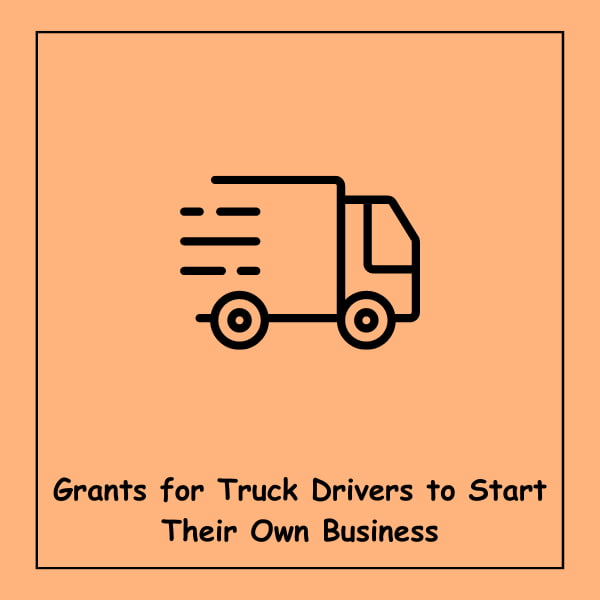
Grants for truck drivers to start their own businesses offer valuable financial assistance to individuals looking to launch independent trucking ventures.
These grants provide funding for various startup costs, including vehicle acquisition, equipment purchases, insurance premiums, and operating expenses.
They are typically offered by government agencies, non-profit organizations, and private foundations to support entrepreneurship and economic development in the trucking industry.
To qualify for grants for truck drivers, applicants must meet specific eligibility criteria, such as holding a valid commercial driver’s license (CDL), demonstrating a viable business plan, and showcasing a commitment to safety and compliance.
Applicants may be required to submit detailed business proposals, financial statements, and supporting documentation to support their grant applications.
Grants for truck drivers can significantly reduce the financial barriers to starting a trucking business and provide aspiring entrepreneurs with the capital needed to launch and grow their ventures.
By leveraging these grants, truck drivers can pursue their entrepreneurial aspirations, create job opportunities, and contribute to the growth and innovation of the trucking industry.
How to Set Up a Freight Transport Company?
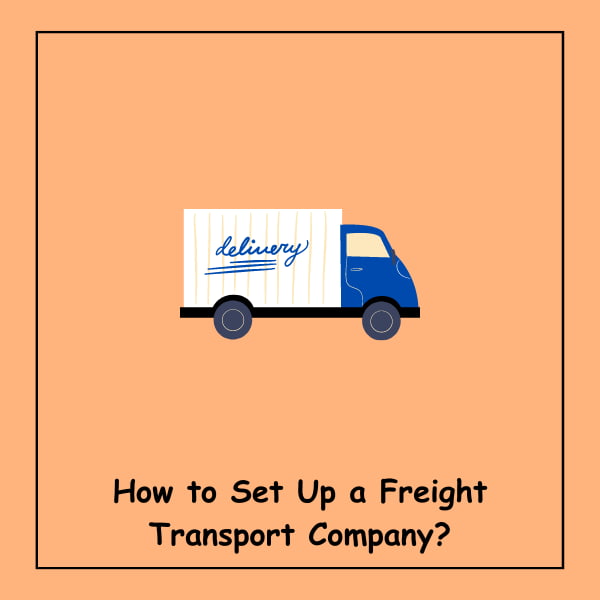
Setting up a freight transport company involves several meticulous steps that are imperative for laying a solid foundation in the transportation industry.
Initially, in-depth market research is crucial to gain insights into the dynamics of the transportation sector, understand prevailing trends, and identify potential opportunities and challenges.
This research serves as a blueprint for devising a robust business plan, which encompasses strategic goals, target demographics, competitive analysis, marketing strategies, and financial forecasts.
Following the formulation of a comprehensive business plan, the next pivotal step is to register the company and acquire all requisite licenses, permits, and certifications mandated by regulatory authorities.
This ensures compliance with legal regulations and enhances the company’s credibility in the industry.
Additionally, entrepreneurs must secure adequate funding to cover various startup expenses, including vehicle procurement, insurance premiums, operational costs, and working capital.
Moreover, investing in high-quality equipment such as trucks, trailers, and logistics technology is indispensable for ensuring efficient operations and delivering exceptional service to clients.
Equally important is the recruitment of skilled and experienced drivers who adhere to safety protocols and possess excellent driving records.
Establishing strong relationships with suppliers, clients, and industry stakeholders fosters collaboration and facilitates business growth.
Lastly, consistently prioritizing customer satisfaction and maintaining a stellar reputation for reliability, punctuality, and professionalism are paramount for sustaining long-term success in the freight transport industry.
By meticulously following these steps and adapting to evolving market demands, entrepreneurs can establish and grow a thriving freight transport company.
How Do You Start a Trucking or Transportation Business?
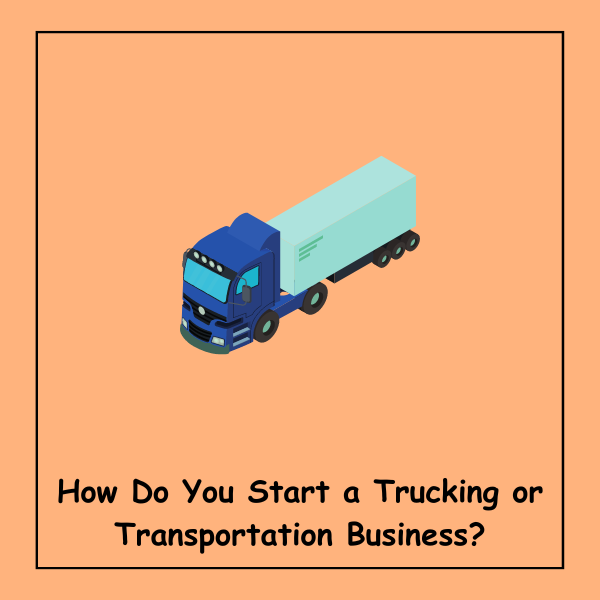
Embarking on the journey of starting a trucking or transportation business demands meticulous planning, strategic execution, and a deep understanding of industry intricacies.
To initiate the process, conducting extensive market research is imperative to identify niche segments, assess demand dynamics, and gauge competition levels.
Armed with these insights, entrepreneurs can craft a comprehensive business plan that delineates the company’s mission, objectives, target market, competitive landscape, marketing strategies, and financial projections.
Subsequently, entrepreneurs must navigate the bureaucratic landscape by registering the business entity and obtaining all requisite licenses, permits, and certifications mandated by regulatory authorities.
This not only ensures legal compliance but also instills trust and credibility among clients and stakeholders.
Securing adequate funding to cover startup expenses such as vehicle procurement, insurance, fuel costs, and operational overheads is critical for launching and sustaining the business.
Furthermore, building a robust network of suppliers, clients, and industry partners is indispensable for establishing a strong foothold in the competitive transportation sector.
Collaborating with reliable suppliers ensures access to quality equipment and resources, while cultivating enduring relationships with clients, fosters loyalty, and generates repeat business.
Additionally, forging strategic partnerships with complementary businesses can unlock synergies and fuel business growth.
Moreover, prioritizing driver safety and compliance with regulatory standards is non-negotiable for safeguarding operations and mitigating risks.
Employing skilled drivers with impeccable driving records and providing ongoing training on safety protocols and industry regulations is essential for maintaining operational excellence.
Furthermore, leveraging technology solutions such as fleet management software and telematics systems can enhance operational efficiency, optimize route planning, and streamline logistics processes.
Embracing innovation and staying abreast of emerging trends in the transportation industry are instrumental for staying competitive and seizing new opportunities for growth.
Conclusion
In conclusion, starting a trucking or transportation business offers lucrative opportunities for entrepreneurs seeking to enter the transportation industry.
By following a strategic approach that includes thorough research, planning, and execution, aspiring business owners can establish successful freight transport companies.
From developing a robust business plan to securing funding, obtaining necessary licenses, and building a strong network of customers and partners, each step is essential for laying the foundation for a thriving business.
With dedication, perseverance, and a commitment to excellence, entrepreneurs can overcome challenges and achieve long-term success in the trucking or transportation industry.
[the_ad id=”39205″]
Frequently Asked Questions (FAQ):
What Are Trucking Grants, and How Do They Support Entrepreneurs in the Transportation Industry?
Trucking grants are financial resources tailored to assist individuals and entities in the transportation sector, specifically focusing on trucking activities. They provide crucial support for various operational aspects, including vehicle acquisition, maintenance, fuel costs, technology upgrades, and infrastructure development.
Where Do Trucking Grants Come From, and What Entities Offer Them?
Trucking grants are available from various sources, including government entities at federal, state, and local levels, private foundations, non-profit organizations, and industry associations. Each funding source may have unique eligibility criteria, application processes, and priorities.
What Is the Eligibility Criteria for Trucking Grants, and How Can Applicants Increase Their Chances of Success?
Eligibility criteria vary, considering factors like business structure, size, location, industry focus, and project goals. Successful applicants typically demonstrate a clear understanding of their business needs, articulate specific objectives, and provide evidence of effective project management. Adherence to application guidelines, timely submission, and thorough documentation are crucial.
What Documents Are Typically Required When Applying for Trucking Grants?
Applicants often need to submit documents such as business registration certificates, financial statements, resumes of key personnel, comprehensive business plans, environmental impact assessments, and proof of compliance with regulatory requirements.
How Can One Apply for Federal Truck Company Grants?
The application process involves researching grant opportunities, reviewing eligibility criteria, preparing required documents, completing the online application form, and submitting the application before the specified deadline. Monitoring the application status, responding to agency requests, and complying with reporting requirements are essential steps after submission.
What Federal Grants Are Available Specifically for Starting a Truck Company?
Various federal grants are available, including those from the Small Business Administration (SBA), Department of Transportation (DOT), Environmental Protection Agency (EPA), Department of Energy (DOE), Workforce Development Grants, Rural Business Development Grants, Veterans Business Outreach Center (VBOC) Grants, and Research and Development Grants.
Are There Additional Grant Opportunities at the State and Local Levels or from Industry-Specific Sources?
Yes, entrepreneurs can explore state-level grants, local economic development grants, industry-specific grants from associations, environmental grants, technology grants, safety grants, export assistance grants, and disaster recovery grants.
Apart from Grants, What Other Sources of Funding Are Available for Starting a Trucking Business?
Other funding sources include traditional bank loans, equipment financing, invoice factoring, angel investors, venture capital, crowdfunding, government contracting opportunities, and franchise opportunities.
How Can Getgovtgrants Assist in Starting a Trucking Business?
Getgovtgrants offers personalized assistance throughout the grant application process, access to a comprehensive database of available grants, training programs, educational resources, and networking opportunities. It aims to empower entrepreneurs with timely updates on new grant opportunities, fostering a supportive community for business advancement.
What Are the Essential Steps in Setting Up a Freight Transport Company?
Setting up a freight transport company involves conducting market research, crafting a detailed business plan, registering the company, acquiring necessary licenses, securing funding, investing in quality equipment, recruiting skilled drivers, building strong relationships with stakeholders, prioritizing customer satisfaction, and consistently adapting to market demands.
How Do You Start a Trucking or Transportation Business?
Starting a trucking or transportation business entails conducting market research, creating a comprehensive business plan, registering the business, obtaining licenses and permits, securing funding, investing in equipment, recruiting skilled drivers, building a network, prioritizing safety and compliance, leveraging technology, and staying informed about industry trends.
What Grants Are Available Specifically for Truck Drivers Looking to Start Their Own Businesses?
Grants for truck drivers aiming to start their own businesses offer financial assistance for startup costs, including vehicle acquisition, equipment purchases, insurance premiums, and operating expenses. These grants are typically provided by government agencies, non-profit organizations, and private foundations.
How Can Entrepreneurs Set Up a Freight Transport Company?
Setting up a freight transport company involves conducting market research, creating a business plan, registering the company, obtaining necessary licenses, securing funding, investing in quality equipment, recruiting skilled drivers, building a network, and prioritizing customer satisfaction.
What Are Some Key Considerations for Starting a Trucking or Transportation Business?
Key considerations include market research, legal compliance, securing funding, investing in quality equipment, building strong relationships with stakeholders, prioritizing safety and compliance, leveraging technology, and maintaining a focus on customer satisfaction.
Where Can Entrepreneurs Find Information on Available Grants and Resources for Starting a Trucking Business?
Entrepreneurs can find information on available grants and resources through platforms like Getgovtgrants, which offer access to a comprehensive database of grants, training programs, educational resources, and networking opportunities.




